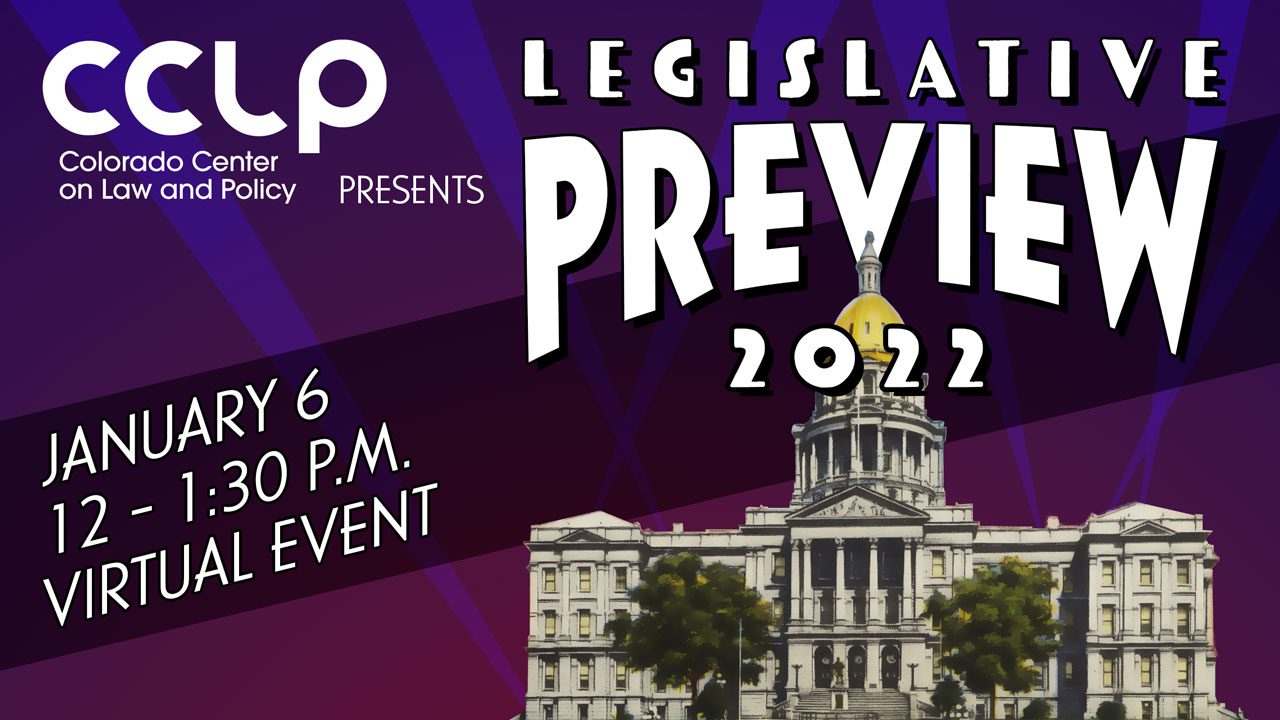The second Regular Session of Colorado’s 73rd General Assembly kicked off on January 12, 2022, scheduled to run through May 11. Colorado Center on Law and Policy will periodically update this page to reflect our priorities throughout the session.
CCLP’s priority bills for 2022
SB22-099: Sealing Criminal Records (“Clean Slate” bill)
Bill sponsors: Senators Hisey & Rodriguez, Representative Tipper
Many types of non-violent criminal records are eligible for sealing under Colorado law, yet the process leaves people behind. For many households, the stigma of a record needlessly creates ongoing obstacles to long-term employment, education, affordable housing, and family well-being. While records are eligible to be sealed, the current process imposes many barriers, including filing court petitions, paying fees, attending hearings, and securing legal representation. This legislation will:
- Automatically Seal Records That Are Currently Eligible
- Protect Coloradans’ Information from Misuse by Third-Party Vendors
- Clarify and Streamline Colorado’s Record Sealing Provisions
CCLP SUPPORTS SB22-099. Read more on the Clean Slate Coaltion’s Fact Sheet.
HB22-1224: Ending unfair prosecution of public benefit recipients
Bill sponsors: Reps Kerry Tipper & Matt Soper, Sen. Julie Gonzales
Public benefits provide basic necessities like health care and food to CO families facing poverty. Ensuring that Coloradans can access these services when they need them not only promotes individual wellbeing but also supports strong local economies and thriving communities. But people can be deterred from seeking support when obtaining benefits risks entanglement with the crim-inal legal system. This can happen because inaccurate information on an application for benefits can lead to prosecution under Colorado’s criminal theft statute. This bill will:
- Ensure nobody is held criminally liable for benefits for which they are eligible
- Require proof that an applicant misrepresented information for the purpose of unlawfully gaining services
- Ensure that criminal liability does not increase due to bureaucratic delays.
CCLP SUPPORTS HB22-1224. Read more on CCLP’s Fact Sheet (pdf).
HB22-1259: Modifications To Colorado Works Program (TANF reform)
Bill sponsors: Representatives Duran & Jodeh, Senator Moreno
Temporary Assistance for Needy Families (TANF), known here as Colorado Works, provides financial support to families far below the federal poverty level. A parent with two children must make less than $421 a month to qualify for TANF basic cash assistance. Even before the pandemic, families enrolled in TANF were facing the greatest barriers to financial security and well-being. For a family of three, living in extreme poverty means getting by on only $10 per person per day. To lift families out of extreme poverty, this legislation will:
- Increase TANF basic cash assistance and ensure that it keeps up with the rising cost of living
- Make improvements to how TANF serves families
- Reduce the “cliff effect” and create a smoother off-ramp to economic security.
- Improve engagement and outreach with families
CCLP SUPPORTS HB22-1259, improving TANF for Colorado families. Read more on the TANF Coalition’s latest Fact Sheet (updated April 12.)
HB22-1289 Health Benefits For Colorado Children And Pregnant Persons (Expanding Healthcare Coverage)
Insurance access improves physical and mental health, and lowers infant, child, and adult mortality rates. Medicaid and the Children’s Health Insurance Program (CHIP) are critical for the health access of pregnant people, new parents, and children.
CCLP SUPPORTS HB22-1289. Read more on the Cover All Coloradans fact sheet (PDF, available in English and Spanish)
Continue and update CO’s Supportive Services Program
Bill sponsors: Representative Exum & Senator Fields
The Employment Support and Job Retention Services Program (or Supportive Services Program) was developed through HB19-1107 as a three-year pilot program within the Colorado Department of Labor and Employment (CDLE). The program created an emergency supportive services fund for community-based organizations (CBOs) and public agencies (PAs) to draw from to serve their participants with barriers to obtaining and maintaining employment. Legislation to be proposed:
- Continue the Supportive Services Program
- Reimburse member organizations within 7 business days
- Prioritize community engagement to rural and underserved communities through outreach to non-traditional services organizations
CCLP SUPPORTS improving and making permanent the Supportive Services Program. Read more on Skills2Compete-Colorado Coalition’s Fact Sheet
Mobile Home Park Resident Protections
Bill sponsors: Representative Boesenecker and Senator Ginal
Before and throughout the pandemic, corporations and private, out-of-state investment funds have purchased mobile home parks, touting them as a profitable investment. At least 20 mobile home parks have been sold without fully following Colorado’s Opportunity to Purchase law. Each time a new operator takes over, home
owners face monthly lot rent increases of as much as 80%. Fixed and low income families are eventually forced out, losing their property interest in their home, causing many families to face displacement or homelessness.
Out-of-state investment funds and corporations who invest in mobile home parks in multiple states have continued to purchase and operate parks in states with regulations similar to what is being proposed in this bill. Mobile Home Parks still remain an attractive investment, even when basic resident protections are put into place. The proposed bill will:
- Increase stability for residents
- Protect affordability of housing
- Create greater accountability for park owners
CCLP SUPPORTS passing basic mobile home park resident protections in Colorado. Read more on the coalition fact sheet (PDF, also available in Spanish)
2022 State Legislation List
Throughout the legislative session, CCLP compiles a list of bills concerning economic opportunity and poverty reduction. This list includes bill sponsors, assigned committees, and the organizations that have expressed their support for or opposition to each bill.
Updated June 13 – final version

Legislative Preview 2022
On January 6, CCLP hosted its 2022 Legislative Preview virtual event. Learn more about this year’s agenda, including Clean Slate, as well as updates in our 4 focus areas.





